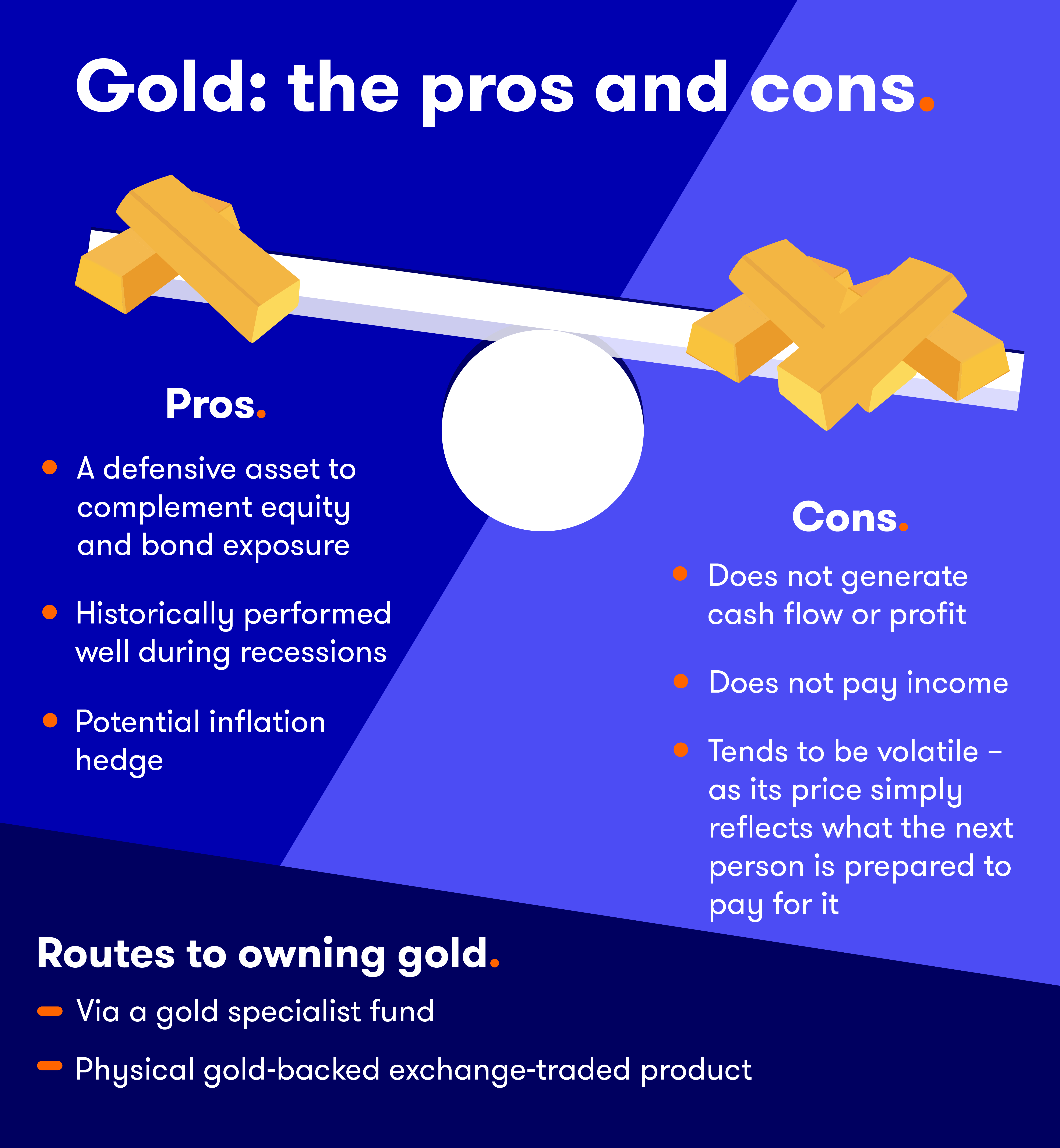Why gold is falling even as Russia threatens nuclear war
4th October 2022 09:27
by Sam Benstead from interactive investor
Interest rates are the key to the gold price, not inflation and war, explains Sam Benstead.

In investing, gold is seen as an insurance policy. It will probably – and hopefully – never be used, and that money could have been spent on more productive things, but when financial markets are rattled it will hopefully go up when everything else is falling.
Or so that’s what we are taught to believe. However, so far this year, amid a record decline for bonds, a bear market for global stocks (in dollar terms), double-digit inflation in Britain and war in Europe, gold has fallen 9% and nearly 20% since March. One ounce now costs just shy of $1,700 compared with around $2,000 in summer 2020.
- Read about our: Sustainable Funds List | Top Investment Funds | Transferring an Investment Account
So, why has this happened, and will the trend reverse given the escalating tension in Europe as Putin mobilises more troops?
Interest rates
In markets, nothing happens in a vacuum. While geopolitical tension and high inflation are generally considered good for the gold price, rising interest rates are bad for it.
As rates go up, the return investors can get from safe government bonds – such as those issued by the US or UK government – also increases. On the other hand, gold is just a shiny metal: it pays no interest.
This means gold’s safe-haven status looks relatively less attractive when income-paying alternatives are considered. The scale of the fixed income sell-off this year – which means yields rise on bonds – has been extreme.
- Investors will now own recycled gold in this popular fund
- Watch our latest fund manager interviews by subscribing for free to the ii YouTube channel
- Gold funds return to form as inflation concerns mount
One year ago, investors were paid an interest rate of about 1% to lend money to the UK government or US government for 10 years. Now they can get more than 4%. A year ago, the opportunity cost to owning gold wasn’t that high, but now it is, especially with inflation at its current elevated level.
Robert-Jan van der Mark of Aegon Asset Management points out: “Gold is the dog that hasn’t barked. Mostly this is because there are some key drivers working against it.
“Gold is competing with US Treasury bonds in its function as a safe-haven asset. Until recently, low US central bank rates had made gold relatively attractive. But the rapid increase in US interest rates, as well as the real yield on inflation-linked bonds turning positive again...has caused gold to lose its shine.”
Strong dollar
A strong dollar has also dented demand for gold. With pounds buying 16% fewer dollars than a year ago, any investor who does not earn dollars has faced higher costs to buy the same amount of gold bars.
Van der Mark adds: “Gold is denominated in US dollars, which has hit demand from overseas buyers as the US dollar has strengthened. Globally, over 50% of demand for gold comes from China and India.
“The strong appreciation of the US dollar - caused by geopolitical unrest and the increasing interest rate differential between the dollar and other major currencies - has served as a headwind for these local currency buyers."
- When gold rallies, these mining shares win big
- Benstead on Bonds: there’s finally an alternative to stocks
- How a weak pound and strong US dollar impacts fund investors
With the US Federal Reserve chair Jerome Powell recently giving a hawkish statement, countering market hopes for rate cuts in 2023, van der Mark sees no reason why the dollar will weaken in the near future, further dampening the prospects for short-term gold price appreciation.
“Based on the continued uptrend in US rates and real yields and the high probably that the current geopolitical unrest will persist for some time to come, we expect continued dollar strength for the foreseeable future
“At the time of the great inflation period in the 1970s, we saw gold prices also underperforming in the first half of the decade. Only when the dollar started depreciating did gold start to surge in price. This tells us that ‘King Dollar’ needs to fade before gold can start to shine,” he said.
Geopolitics
Gold initially spiked in the build-up to Russia’s invasion of Ukraine, but then began to decline in value from mid-March.
Nevertheless, some fund managers still view it as an insurance policy if the war was to escalate further.
David Coombs, an investment manager at fund group Rathbones, has bought gold for his multi-asset fund.
He said: “It may seem a strange time to buy a non-yielding asset like gold, what with interest rates rising rapidly. However, we think gold comes into its own during times of swirling uncertainty and when people are worried about the world coming apart at the seams (war, famine, hyperinflation, that sort of thing).”
- Sterling hits record low: the bond and stock market winners and losers
- Kwasi Kwarteng’s explosive mini-budget 2022: winners and losers
However, Peter Spiller, manager of the Super 60-rated Capital Gearing (LSE:CGT) investment trust, is not a big fan of gold and allocates just 1% of his mixed-investment portfolio to it.
Spiller said the big issue with gold was how to value it given that it does not pay any income. He said: “One approach is to look at long-term price over past centuries with the idea being that gold holds its value over longer periods
“In 1972, an ounce cost $100, and adjusted for inflation that should be worth $550 today. But gold is trading at a big premium to that today because of low interest rates.”
Spiller says that gold does play a small role in a portfolio, however. He points out: “It will do very well when investors think they may lose everything, such as in times of war.
“Political instability in China may have the same effect on gold and then send the price higher as the Chinese may buy gold to be safe. You don’t care about the return in these market – you just what to hold your value worth and have something physical. It becomes an insurance policy and investors won’t care about the premium they have to pay for it.”
Spiller prefers to own index-linked bonds as insurance against inflation and geopolitical meltdown
“Index-linked bonds have fallen in value this year, which makes them even more attractive. We have a 20 to one index-linked bonds to gold ratio in our portfolio. We have an inflation problem, but not a global meltdown problem.”

These articles are provided for information purposes only. Occasionally, an opinion about whether to buy or sell a specific investment may be provided by third parties. The content is not intended to be a personal recommendation to buy or sell any financial instrument or product, or to adopt any investment strategy as it is not provided based on an assessment of your investing knowledge and experience, your financial situation or your investment objectives. The value of your investments, and the income derived from them, may go down as well as up. You may not get back all the money that you invest. The investments referred to in this article may not be suitable for all investors, and if in doubt, an investor should seek advice from a qualified investment adviser.
Full performance can be found on the company or index summary page on the interactive investor website. Simply click on the company's or index name highlighted in the article.